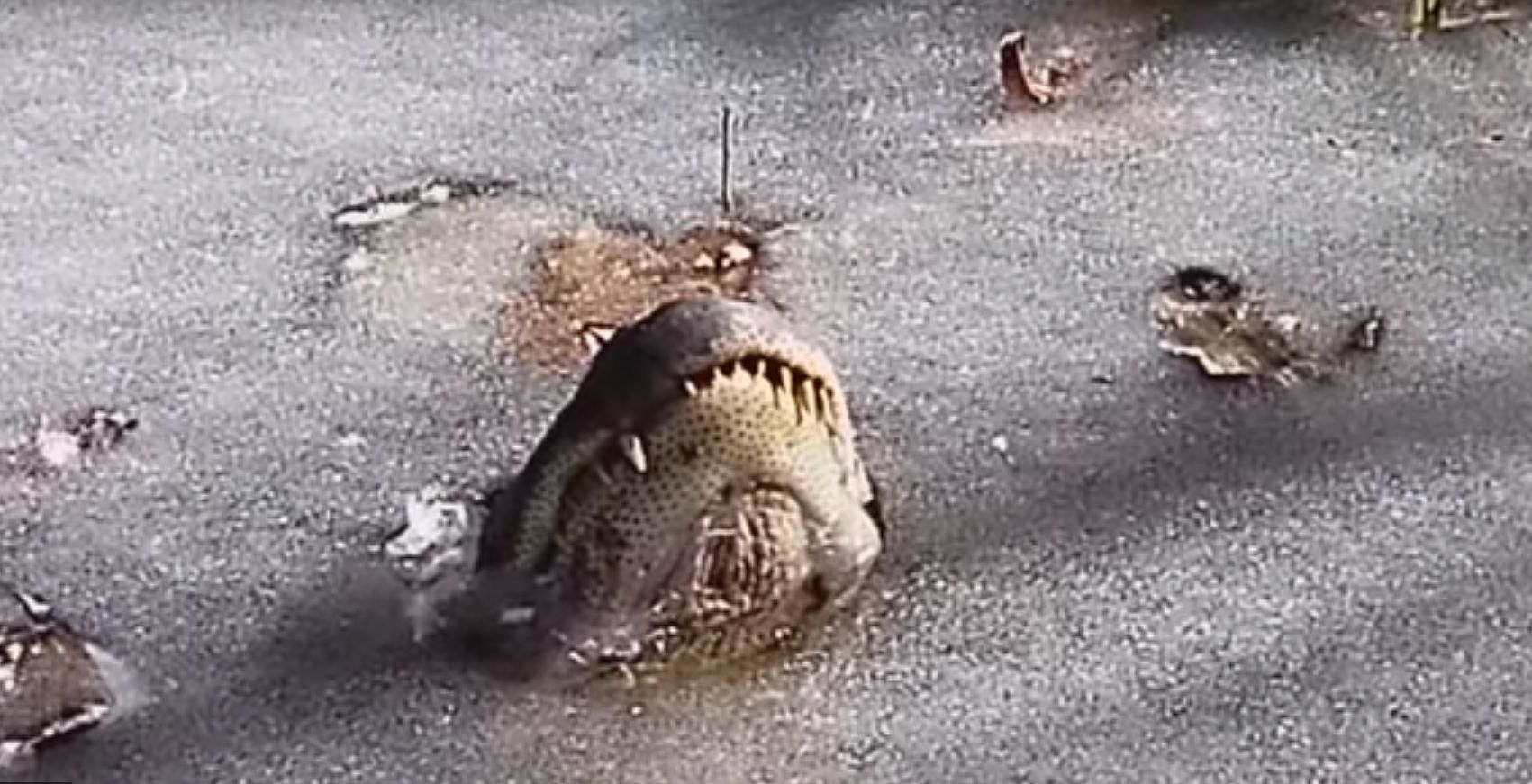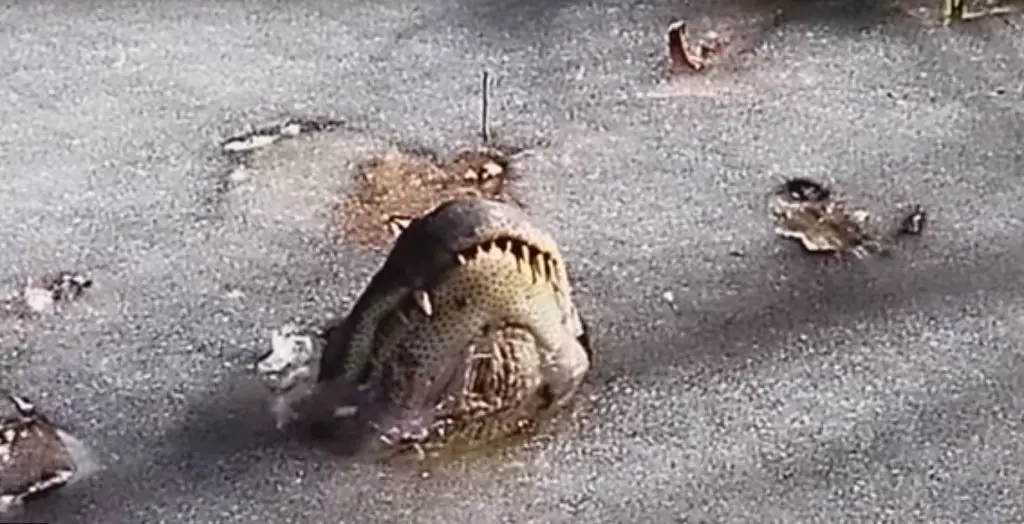Alligators are fascinating creatures that have been around for millions of years. They are known for their powerful jaws and sharp teeth, but did you know that they also hibernate? That’s right, these cold-blooded reptiles have a unique way of surviving the cold winter months.
During hibernation, alligators slow down their metabolism, lower their body temperature, and conserve energy. But how do they do it? In this article, we’ll explore the fascinating world of alligator hibernation and learn more about these incredible animals. So, let’s dive in!
Alligators do not hibernate in the traditional sense. Instead, they undergo a period of dormancy called brumation. During brumation, alligators slow down their metabolism and become less active, but they are still able to move around and occasionally come up for air. They typically brumate during the colder months when their metabolism slows down due to the temperature drop.

How Do Alligators Hibernate?
Alligators are fascinating creatures that have captured the imagination of humans for centuries. However, there is still much we don’t know about these ancient reptiles. One of the most intriguing mysteries is how alligators hibernate. Do these cold-blooded animals go into a deep sleep like bears, or do they have a different way of surviving the winter months? Let’s find out.
What is Hibernation?
Hibernation is a state of inactivity that some animals enter during the winter months. It allows them to conserve energy and survive when food is scarce. During hibernation, an animal’s body temperature drops, its heart rate slows down, and its breathing becomes shallow. Bears, bats, and groundhogs are some of the most well-known hibernators.
Do Alligators Hibernate?
The short answer is no. Alligators do not hibernate in the way that we traditionally think of hibernation. However, they do have a unique way of surviving the winter months.
How Do Alligators Survive the Winter?
Alligators are cold-blooded animals, which means that their body temperature is regulated by their environment. When the temperature drops, their metabolism slows down, and they become less active. They also become less aggressive and may stop feeding altogether.
What Happens to Alligators During Cold Weather?
During cold weather, alligators will seek out warm, sunny spots to bask in. They may also seek out burrows or other areas where they can stay dry and warm. When the temperature drops below freezing, they can become trapped in ice. However, they have a unique way of surviving this situation.
What is Brumation?
Brumation is a state of dormancy that reptiles enter during the winter months. It is similar to hibernation but is not as deep. During brumation, reptiles will slow down their metabolism and become less active. However, they will still move around and may even venture out to bask in the sun on warm days.
Do Alligators Brumate?
Yes, alligators do brumate. During the winter months, they will slow down their metabolism and become less active. However, they will still move around and may even venture out to bask in the sun on warm days.
How Do Alligators Prepare for Brumation?
Before entering brumation, alligators will eat as much as they can to build up fat reserves. They will also seek out warm, dry places to spend the winter months. Alligators may also go without food for several weeks before entering brumation.
How Long Do Alligators Brumate?
Alligators can brumate for several months, depending on the climate. In warmer climates, they may only brumate for a few weeks. In colder climates, they may brumate for several months.
Benefits of Brumation for Alligators
Brumation allows alligators to conserve energy and survive when food is scarce. It also helps them to avoid the harsh winter weather. By slowing down their metabolism, alligators can survive on fewer calories and go without food for longer periods of time.
Brumation Vs Hibernation
While brumation and hibernation are similar in many ways, there are some key differences. Hibernation is a deep state of sleep that some animals enter during the winter months. During hibernation, an animal’s body temperature drops, its heart rate slows down, and its breathing becomes shallow. Brumation, on the other hand, is a state of dormancy that reptiles enter during the winter months. It is similar to hibernation but is not as deep. During brumation, reptiles will slow down their metabolism and become less active. However, they will still move around and may even venture out to bask in the sun on warm days.
Conclusion
Alligators may not hibernate in the traditional sense, but they do have a unique way of surviving the winter months. By slowing down their metabolism and becoming less active, they can conserve energy and survive on fewer calories. Brumation allows alligators to avoid the harsh winter weather and emerge in the spring ready to mate and feed once again.
Frequently Asked Questions
In this section, you will find answers to some of the most commonly asked questions about alligators and their hibernation habits.
What is hibernation and why do alligators do it?
Hibernation is a state of inactivity that some animals enter during cold weather when food is scarce. Alligators hibernate to conserve energy during the winter months when their metabolism slows down due to the drop in temperature. By hibernating, alligators can survive for several months without eating or moving much.
During hibernation, alligators lower their body temperature, heart rate, and breathing rate. They also go without food and water for long periods. Hibernation helps alligators survive the harsh winter weather and emerge in the spring when the temperature warms up and food becomes more abundant.
Where do alligators hibernate?
Alligators hibernate in burrows or dens that they dig themselves. The burrows are typically located near bodies of water, such as rivers, swamps, and lakes. Alligators prefer to hibernate in burrows that have a stable temperature and humidity level. They may also hibernate in shallow water or under piles of vegetation.
Alligator burrows can be up to 20 feet deep and 40 feet long. They are usually dug in soft soil, such as mud or sand. Alligators may share burrows with other alligators or other animals, such as turtles or snakes.
How long do alligators hibernate?
The length of alligator hibernation varies depending on the climate and location. In warmer regions, such as Florida, alligators may not hibernate at all. In colder regions, such as the northern part of their range, alligators may hibernate for several months.
During hibernation, alligators can go without food or water for several months. They emerge from hibernation in the spring when the temperature warms up and food becomes more abundant.
Do alligators hibernate alone or in groups?
Alligators may hibernate alone or in groups, depending on the location and availability of suitable hibernation sites. In warmer regions, alligators may not hibernate at all and may continue to bask in the sun during the winter months. In colder regions, alligators may hibernate together in groups to conserve body heat.
During hibernation, alligators may share burrows with other alligators or other animals, such as turtles or snakes. Sharing a burrow can help alligators conserve heat and reduce the risk of predation during hibernation.
How do alligators prepare for hibernation?
Alligators prepare for hibernation by increasing their food intake during the fall months. They store fat in their bodies to use as energy during hibernation. Alligators also seek out suitable hibernation sites, such as burrows or shallow water.
Before entering hibernation, alligators lower their body temperature, heart rate, and breathing rate. They also stop eating and may empty their digestive tract to reduce the risk of intestinal blockage during hibernation. Alligators emerge from hibernation in the spring when the temperature warms up and food becomes more abundant.
Do alligators hibernate? | Natural History Museum
In conclusion, alligators are fascinating creatures that have developed unique survival mechanisms. While they don’t technically hibernate, they do enter a state of brumation during the winter months. During this time, their metabolism slows down, and they become less active to conserve energy.
This is a crucial adaptation for alligators living in cooler climates where temperatures can drop below freezing. By slowing down their metabolism, alligators can survive for weeks without eating and conserve their energy until warmer weather returns.
While it may seem like alligators are just lazy during the winter months, they are actually employing a sophisticated survival strategy. As we continue to learn more about these incredible animals, we can gain a greater appreciation for the unique ways they have adapted to their environments.


